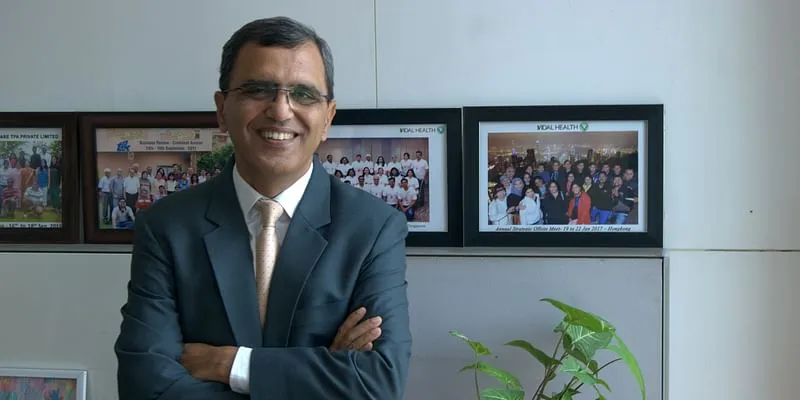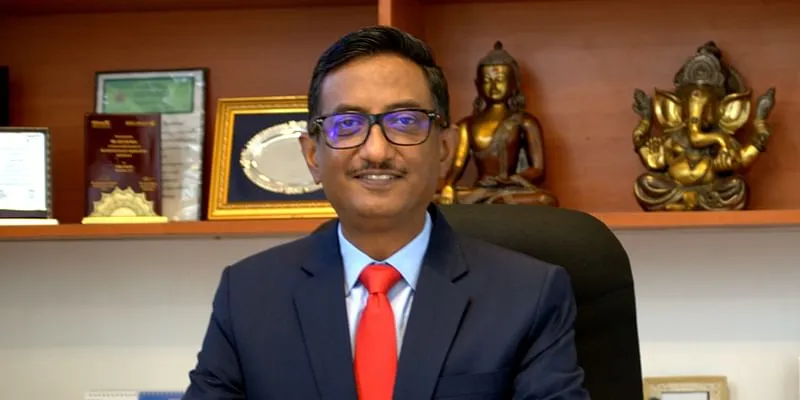Meet the mechanical engineer who quit his job to build a healthcare TPA business
Girish Rao started Vidal Health in 2002 in Bengaluru with the mission to provide third-party administration services. Today, the business handles a premium portfolio of Rs 3,000 crore in health insurance.
India’s liberalisation of the insurance sector and the rising popularity of the Internet in the late 90s’ triggered Girish Rao’s entrepreneurial journey.
As someone looking to challenge the status quo and solve complex problems, the mechanical engineer started Vidal Health in 2002 in Bengaluru to provide third-party administration (TPA) services in the healthcare space. Shankar Bali — a telecom and fintech professional — joined him as the Joint Managing Director.
“At that time, Indian insurance opened up for private organisations. I got the license and began Vidal Health with the mission to provide good quality TPA services to health insurance policyholders in India and abroad,” Girish tells SMBStory.
At present, Vidal — one of India's top health services management companies — operates at over 800 locations in India and partners with over 10,000 empanelled service providers, including hospitals, diagnostics labs, and clinicians.
Girish claims Vidal processes over one million claims and eight lakh pre-authorisation requests annually. In fact, it handles a premium portfolio of Rs 3,000 crore in health insurance.
However, for Girish, the failure of his first venture sowed the seeds for the inception of Vidal Health.

Vidal Health Joint Managing Director Shankar Bali
From NRI services to TPA
Armed with an MBA in marketing, Girish worked his way up to heading sales and marketing at Hutchison Telecom (now Vodafone India). Nevertheless, he left behind the cushy corporate world, and launched a business to help NRIs with healthcare services for their aged parents living in India.
“In the US, NRIs were having issues with taking care of their parents back home. They could not frequently travel between the two countries. At the time, Jeff Bezos was championing the Internet. Inspired, I launched a services portal for NRIs and their parents,” he shares.
Girish tried various models, including working with banks to create NRI databases and acquiring a company that physically posted emails from NRIs to aged parents without Internet access. However, the venture went nowhere.
Between 2000-2002, Girish lost the money he had invested. Despite this, he realised the network of hospitals he had built in major Indian cities could come in handy when the government was opening up health insurance to the private sector.
“In 2001, there was a white paper describing how private organisations can exist in this space. Looking at the document, I felt I had already created a network to build such an organisation. In 2002, I applied and got a license,” he says.
The no-protocol challenge
By no means was Girish an insurance expert. He had no experience in dealing with sector-specific problems beforehand, and therefore, he worked towards addressing each challenge individually.
During Vidal’s early years, Indian hospitals did not have a predetermined protocol for treating health issues.
Girish says, “If you walked into an American hospital complaining of chest pain, there was a protocol that was followed based on tests and their outcomes. They had also adopted the cashless model of payment. Here, patients paid hospitals in cash, and there was a lack of transparency, causing problems for insurance providers.”
Vidal Health faced strong pushback from doctors and hospitals when it recommended they create and follow protocol.
“Every month, there were serious meetings with doctors. There would be showdowns where they’d ask us on what basis we were telling them of a protocol to treat patients. We told them that if they followed protocol, it would allow insurance providers to do their job, and thereby, boost the doctors’ practices,” Girish says.
Realising the value of health insurance, hospitals and doctors eventually came on board with the idea of following protocol. But, it still took time to move to cashless forms of payment.

Vidal Health Chairman and MD Girish Rao
Moving to cashless
“Till 2002, hospitals were cash businesses. They didn’t understand credit. When TPA and cashless transactions became essential, hospitals faced problems with invoicing and handling their working capital. They were not used to a patient walking away after treatment without paying on the spot and the bill being sent to them later,” Girish says.
The hospitals Vidal worked with were also not clear about certain items on bills that were covered by insurance and those that were not. Sometimes, they accused insurance providers of non-payment.
“There was no mechanism to track which files were sent to whom and whether all items on bills would be paid for by the insurance companies. So we created a transparent mechanism that regularly updated hospitals on the files received, authorised, claims invoiced, etc.,” Girish adds.
Dealing with these challenges paved the way for Vidal’s growth into a large-scale TPA in health services. At present, it is an integrated healthcare services company that also offers empanelment and contracting, enrolment, pricing, and actuarial services.
It has been delivering TPA services to citizens covered under Ayushman Bharat-PMJAY and state health policies.
“Apart from being a highly-preferred TPA with over three million lives managed, we bag 60 percent share of state and central government policy implementation. We are the second-largest TPA company in India,” Girish claims, naming the likes of Medi Assist (India’s largest TPA) and MD India as competitors.
COVID-19 impact and the road ahead
The COVID-19 pandemic was a first for stakeholders across the healthcare sector as no clear terms were described if COVID-related treatment would be covered under existing health insurance policies.
Girish says, “The insurance industry stepped in. It said that COVID-related treatment will be covered. But there was a debate on what items would be covered.”
Health insurance policies don’t usually cover consumables such as aprons and gloves used in treatment. During treatment for COVID-19, PPE kits were essential, expensive, and formed a sizeable chunk of the bill.
Further, there was a lack of standardisation and transparency among hospitals on how many PPE kits were used for treating a COVID case.
“The industry came together to generate a definition for PPE kits and agreed on a broad structure for their use. We were also initially hit by huge bills for treating respiratory problems of COVID patients. Protocols were soon put in place, and the issues were clarified,” he says.
The overall insurance industry in India was worth $280 billion in 2020, and the life insurance industry is now expected to increase by 14 to 15 percent annually for the next three to five years, according to IBEF data.
While Vidal is well-poised to tap into this growing opportunity, Girish believes India is still far away from fully integrating protocols into the healthcare system. But, he maintains the value proposition for health insurance and TPA providers is nevertheless on the rise.
“Wellness is becoming more critical. Corporates are looking at health in a broader sense, and this will impact how Vidal Health will evolve as a company. Going forward, there will be more value in keeping fit,” he says.
Edited by Suman Singh









